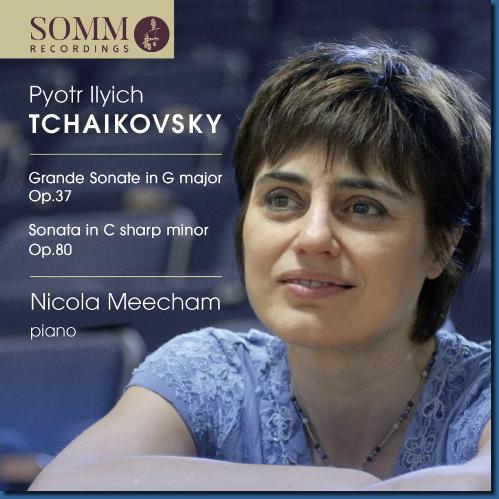 |
||||
"Recorded in 2012, this CD gives us both of Tchaikovsky’s piano sonatas: the early (1865) Sonata in C♯ Minor, posthumously assigned the opus number of 80, and the Grande Sonate, op. 37 of 1878, plus four shorter works for solo piano. This is the second CD on SOMM by Nicola Meecham, who was not previously known to me; the first, featuring music by Janáček, Kodály, and Enescu, appears not to have been reviewed in Fanfare, but was well received elsewhere. The op. 37 Sonata is full of what Andrew Huth, in the notes for the BIS recording by Freddy Kempf (Fanfare 39:6), aptly calls “big public gestures”; to my ears it sometimes seems to substitute these for profundity, and in the first movement especially there is a certain amount of note-spinning. Meecham has plenty of power for the opening theme, but also plays up the movement’s lyricism. She is limber in the cross-rhythms of the Scherzo, and likewise projects clearly the rhythmic structure of the Finale’s first theme. Her interpretation is a compromise between Kempf’s fleet, sometimes hurried approach and the broader, heavier interpretation of Nicolai Lugansky (41:2), which I would avoid. Despite the obvious advocacy of Somm’s annotator Robert Matthew-Walker, the early C♯-Minor Sonata is clearly weak in places; the second movement, with Tchaikovsky’s successively more elaborate statements of his main theme, is somewhat square, and the Scherzo—which was to be reused in the First Symphony—meanders at the point of the transition to the final movement. The ending—Matthew-Walker treats Tchaikovsky’s use of D♭ Major as though it were somehow exceptional, when in fact an ending in the parallel major (spelled enharmonically here) is common coin in minor-mode pieces—is rather abrupt. Meecham makes about as good a case for the sonata as can be made, which is saying something. Of the shorter works, two—the Humoresque and the Feuillet d’album—are probably best known through Stravinsky’s use of them in his ballet Le baiser de la fée. In the Feuillet d’album as well as the Nocturne, Meecham is attractively understated; only in the Humoresque does she seem a little flat-footed. The inventive Doumka (or Dumka), possibly the most original of Tchaikovsky’s shorter works for piano, is absolutely convincing here. Both Kempf and Meecham are worth hearing in the G-Major Sonata; the former is more exciting but also a little hectic in places. Ultimately a decision may best be based on the coupling, which in Kempf’s case is The Seasons, Tchaikovsky’s collection of 12 pieces based on the months of the year. This is a more important work than the early sonata given here, but the reader is also more likely already to own a recording of it, so it’s up to you." Richard A. Kaplan/Fanfare Magazine "Without a doubt, Meecham with her highly-accomplished performances, the SOMM Recordings label for the great fidelity and care with which they have captured this on disc, and, of course, Matthew-Walker’s advocacy throughout his interesting and compelling sleeve-notes, have all sought to present a united front in favour of the greater acceptance of Tchaikovsky’s solo-piano music, and particularly the larger forms like the two sonatas. ...it would seem appropriate to comment on the quite superb playing by British pianist Nicola Meecham throughout the CD as a whole... which makes it a real little gem. This new CD does Tchaikovsky absolutely no disservice as far as his works for piano and orchestra, chamber music with piano, and piano miniatures are concerned – in fact, quite the opposite in terms of the latter." |
||||
"...when confronted by a disc such as this, containing the two completed (sonatas) in very fine performances, so well recorded, one can only bemoan the fact of their relative obscurity. Nicola Meecham here delivers performances of considerable distinction, which are moreover excellently recorded so that our gratitude for this greatly-gifted artist is manifold. I hope to hear more from this fine artist in the not too distant future."
James Palmer/Musical Opinion
"Nicola Meecham’s playing enlivens this pleasant if not especially memorable work (Op 80 Sonata). The mature Grande Sonate in G major is more assured and imposing. Meecham is suitably resolute in the opening, if a fraction slow, and her articulation of the finale’s flood of notes is impressive – best of all is the tender drooping melancholy of the Andante. Four short pieces find Tchaikovsky, and Meecham, at their best: a delicate Nocturne Op.19 No.4 and Feuillet d’album Op.19 No.3; the well-known Humoresque Op. 10 No. 2; and a fiery Doumka in C minor."
Norman Stinchcombe/Birmingham Post
“Tchaikovsky’s piano sonatas aren't the most graceful works but Meecham makes a good case for them”
BBC Music Magazine